- Home
- Stephen Hawking
My Brief History
My Brief History Read online
(illustration credit fm.1)
Copyright © 2013 by Stephen W. Hawking
All rights reserved.
Published in the United States by Bantam Books, an imprint of The Random House Publishing Group, a division of Random House LLC, a Penguin Random House Company, New York.
BANTAM BOOKS and the HOUSE colophon are registered trademarks of Random House LLC.
Illustration credits appear on this page.
Published simultaneously in the United Kingdom by Bantam Press, part of Transworld Publishers, a member of The Random House Group, London.
Portions of this work originally appeared in different form as part of lectures given by the author throughout the years.
LIBRARY OF CONGRESS CATALOGING-IN-PUBLICATION DATA
Hawking, Stephen.
My brief history / Stephen Hawking.
pages cm
eISBN: 978-0-345-53913-7
1. Hawking, Stephen, 1942– 2. Physicists—Great Britain—Biography. 3. Cosmology. 4. Black holes (Astronomy) I. Title.
QC16.H33A3 2013
530.092—dc23
[B}
2013027938
www.bantamdell.com
Jacket design: Kathleen Lynch/Black Kat Design
Front-jacket photograph: courtesy of the author/
© Gillman and Soame UK
v3.1
CONTENTS
Cover
Title Page
Copyright
1 Childhood
2 St. Albans
3 Oxford
4 Cambridge
5 Gravitational Waves
6 The Big Bang
7 Black Holes
8 Caltech
9 Marriage
10 A Brief History of Time
11 Time Travel
12 Imaginary Time
13 No Boundaries
Dedication
Illustration Credits
Other Books by This Author
About the Author
(illustration credit fm.2)
1
CHILDHOOD
MY FATHER, FRANK, CAME FROM A LINE OF TENANT farmers in Yorkshire, England. His grandfather—my great-grandfather John Hawking—had been a wealthy farmer, but he had bought too many farms and had gone bankrupt in the agricultural depression at the beginning of this century. His son Robert—my grandfather—tried to help his father but went bankrupt himself. Fortunately, Robert’s wife owned a house in Boroughbridge in which she ran a school, and this brought in a small amount of income. They thus managed to send their son to Oxford, where he studied medicine.
My father won a series of scholarships and prizes, which enabled him to send money back to his parents. He then went into research in tropical medicine, and in 1937 he traveled to East Africa as part of that research. When the war began, he made an overland journey across Africa and down the Congo River to get a ship back to England, where he volunteered for military service. He was told, however, that he was more valuable in medical research.
My father and I (illustration credit 1.1)
With my mother (illustration credit 1.2)
My mother was born in Dunfermline, Scotland, the third of eight children of a family doctor. The eldest was a girl with Down syndrome, who lived separately with a caregiver until she died at the age of thirteen. The family moved south to Devon when my mother was twelve. Like my father’s family, hers was not well off. Nevertheless, they too managed to send my mother to Oxford. After Oxford, she had various jobs, including that of inspector of taxes, which she did not like. She gave that up to become a secretary, which was how she met my father in the early years of the war.
I WAS born on January 8, 1942, exactly three hundred years after the death of Galileo. I estimate, however, that about two hundred thousand other babies were also born that day. I don’t know whether any of them was later interested in astronomy.
I was born in Oxford, even though my parents were living in London. This was because during World War II, the Germans had an agreement that they would not bomb Oxford and Cambridge, in return for the British not bombing Heidelberg and Göttingen. It is a pity that this civilized sort of arrangement couldn’t have been extended to more cities.
We lived in Highgate, in north London. My sister Mary was born eighteen months after me, and I’m told I did not welcome her arrival. All through our childhood there was a certain tension between us, fed by the narrow difference in our ages. In our adult life, however, this tension has disappeared, as we have gone different ways. She became a doctor, which pleased my father.
My sister Philippa was born when I was nearly five and better able to understand what was happening. I can remember looking forward to her arrival so that there would be three of us to play games. She was a very intense and perceptive child, and I always respected her judgment and opinions. My brother, Edward, was adopted much later, when I was fourteen, so he hardly entered my childhood at all. He was very different from the other three children, being completely non-academic and non-intellectual, which was probably good for us. He was a rather difficult child, but one couldn’t help liking him. He died in 2004 from a cause that was never properly determined; the most likely explanation is that he was poisoned by fumes from the glue he was using for renovations in his flat.
Me, Philippa, and Mary (illustration credit 1.3)
My siblings and me at the beach (illustration credit 1.4)
MY EARLIEST memory is of standing in the nursery of Byron House School in Highgate and crying my head off. All around me, children were playing with what seemed like wonderful toys, and I wanted to join in. But I was only two and a half, this was the first time I had been left with people I didn’t know, and I was scared. I think my parents were rather surprised at my reaction, because I was their first child and they had been following child development textbooks that said that children ought to be ready to start making social relationships at two. But they took me away after that awful morning and didn’t send me back to Byron House for another year and a half.
At that time, during and just after the war, Highgate was an area in which a number of scientific and academic people lived. (In another country they would have been called intellectuals, but the English have never admitted to having any intellectuals.) All these parents sent their children to Byron House School, which was a very progressive school for those times.
I remember complaining to my parents that the school wasn’t teaching me anything. The educators at Byron House didn’t believe in what was then the accepted way of drilling things into you. Instead, you were supposed to learn to read without realizing you were being taught. In the end, I did learn to read, but not until the fairly late age of eight. My sister Philippa was taught to read by more conventional methods and could read by the age of four. But then, she was definitely brighter than me.
We lived in a tall, narrow Victorian house, which my parents had bought very cheaply during the war, when everyone thought London was going to be bombed flat. In fact, a V-2 rocket landed a few houses away from ours. I was away with my mother and sister at the time, but my father was in the house. Fortunately, he was not hurt, and the house was not badly damaged. But for years there was a large bomb site down the road, on which I used to play with my friend Howard, who lived three doors the other way. Howard was a revelation to me because his parents weren’t intellectuals like the parents of all the other children I knew. He went to the council school, not Byron House, and he knew about football and boxing, sports that my parents wouldn’t have dreamed of following.
Our street in Highgate, London (illustration credit 1.5)
ANOTHER EARLY memory was getting my first train set. Toys were not manufactured during the war, at least not for the home market. But I had a
passionate interest in model trains. My father tried making me a wooden train, but that didn’t satisfy me, as I wanted something that moved on its own. So he got a secondhand clockwork train, repaired it with a soldering iron, and gave it to me for Christmas when I was nearly three. That train didn’t work very well. But my father went to America just after the war, and when he came back on the Queen Mary he brought my mother some nylons, which were not obtainable in Britain at that time. He brought my sister Mary a doll that closed its eyes when you laid it down. And he brought me an American train, complete with a cowcatcher and a figure-eight track. I can still remember my excitement as I opened the box.
London during the Blitz (illustration credit 1.6)
Me with my train set (illustration credit 1.7)
Clockwork trains, which you had to wind up, were all very well, but what I really wanted were electric trains. I used to spend hours watching a model railway club layout in Crouch End, near Highgate. I dreamed about electric trains. Finally, when both my parents were away somewhere, I took the opportunity to draw out of the Post Office bank all of the very modest amount of money that people had given me on special occasions, such as my christening. I used the money to buy an electric train set, but frustratingly enough, it didn’t work very well either. I should have taken the set back and demanded that the shop or manufacturer replace it, but in those days the attitude was that it was a privilege to buy something, and it was just your bad luck if it turned out to be faulty. So I paid for the electric motor of the engine to be serviced, but it never worked very well, even then.
Later on, in my teens, I built model airplanes and boats. I was never very good with my hands, but I did this with my school friend John McClenahan, who was much better and whose father had a workshop in their house. My aim was always to build working models that I could control. I didn’t care what they looked like. I think it was the same drive that led me to invent a series of very complicated games with another school friend, Roger Ferneyhough. There was a manufacturing game, complete with factories in which units of different colors were made, roads and railways on which they were carried, and a stock market. There was a war game, played on a board of four thousand squares, and even a feudal game, in which each player was a whole dynasty, with a family tree. I think these games, as well as the trains, boats, and airplanes, came from an urge to know how systems worked and how to control them. Since I began my PhD, this need has been met by my research into cosmology. If you understand how the universe operates, you control it, in a way.
2
ST. ALBANS
IN 1950 MY FATHER’S PLACE OF WORK MOVED FROM Hampstead, near Highgate, to the newly constructed National Institute for Medical Research in Mill Hill, on the northern edge of London. Rather than travel out from Highgate, it seemed more sensible for him to move the family out of London and travel into town for work. My parents therefore bought a house in the cathedral city of St. Albans, about ten miles north of Mill Hill and twenty miles north of central London. It was a large Victorian house of some elegance and character. My parents were not very well off when they bought it, and they had to have quite a lot of work done on it before we could move in. Thereafter my father, like the Yorkshireman he was, refused to pay for any further repairs. Instead, he did his best to keep it up and keep it painted, but it was a big house and he was not very skilled in such matters. The house was solidly built, however, so it withstood this neglect. My parents sold it in 1985, when my father was very ill, a year before he died. I saw it recently—it didn’t seem that any more work had been done on it.
Our house in St. Albans (illustration credit 2.1)
The house had been designed for a family with servants, and in the pantry there was an indicator board that showed which room a bell had been rung from. Of course we didn’t have servants, but my first bedroom was a little L-shaped space that must have been a maid’s room. I asked for it at the suggestion of my cousin Sarah, who was slightly older than me and whom I greatly admired. She said that we could have great fun there. One of the attractions of the room was that one could climb out the window onto the roof of the bicycle shed, and thence to the ground.
Sarah was the daughter of my mother’s eldest sister, Janet, who had trained as a doctor and was married to a psychoanalyst. They lived in a rather similar house in Harpenden, a village five miles farther north. They were one of the reasons we moved to St. Albans. It was a great bonus to me to be near Sarah, and I frequently went on the bus to Harpenden to see her.
St. Albans itself stood next to the remains of the ancient Roman city of Verulamium, which had been the most important Roman settlement in Britain after London. In the Middle Ages it had had the richest monastery in Britain. It was built around the shrine of Saint Alban, a Roman centurion who is said to have been the first person in Britain to be executed for his Christian faith. All that remained of the abbey was a very large and rather ugly church and the old gateway building, which was now part of St. Albans School, where I later went. St. Albans was a somewhat stodgy and conservative place compared with Highgate or Harpenden. My parents made hardly any friends there. In part this was their own fault, as they were naturally rather solitary, particularly my father. But it also reflected a different kind of population; certainly, none of the parents of my school friends in St. Albans could be described as intellectuals.
In Highgate our family had seemed fairly normal, but in St. Albans I think we were definitely regarded as eccentric. This perception was increased by the behavior of my father, who cared nothing for appearances if this allowed him to save money. His family had been very poor when he was young, and it had left a lasting impression on him. He couldn’t bear to spend money on his own comfort, even when, in later years, he could afford to. He refused to put in central heating, even though he felt the cold badly. Instead he would wear several sweaters and a dressing gown on top of his normal clothes. He was, however, very generous to other people.
In the 1950s he felt we couldn’t afford a new car, so he bought a prewar London taxi, and he and I built a Nissen hut as a garage. The neighbors were outraged, but they couldn’t stop us. Like most boys, I was embarrassed by my parents. But it never worried them.
For holidays, my parents bought a Gypsy caravan, which they placed in a field at Osmington Mills, on the south coast of Britain near Weymouth. The caravan had been brightly and elaborately decorated by its original Gypsy owners. My father painted it green all over to make it less obvious. The caravan had a double bed for the parents and a cupboard underneath for the children, but my father converted it to bunk beds using army-surplus stretchers, while my parents slept in an army-surplus tent next door. We had our summer holidays there until 1958, when the county council finally managed to remove the caravan.
(illustration credit 2.2)
Our Gypsy caravan (illustration credit 2.3)
WHEN WE first came to St. Albans, I was sent to the High School for Girls, which despite its name took boys up to the age of ten. After I had been there one term, however, my father made one of his almost yearly visits to Africa, this time for a rather long period, about four months. My mother didn’t feel like being left alone all that time, so she took my two sisters and me to visit her school friend Beryl, who was married to the poet Robert Graves. They lived in a village called Deya, on the Spanish island of Majorca. This was only five years after the war, and Spain’s dictator, Francisco Franco, who had been an ally of Hitler and Mussolini, was still in power. (In fact, he remained in power for another two decades.) Nevertheless, my mother, who had been a member of the Young Communist League before the war, went with three young children by boat and train to Majorca. We rented a house in Deya and had a wonderful time. I shared a tutor with Robert’s son William.
Me sailing on Oulton Broad, Suffolk (illustration credit 2.4)
This tutor was a protégé of Robert’s and was more interested in writing a play for the Edinburgh festival than in teaching us. To keep us occupied, he therefore set us to
read a chapter of the Bible each day and write a piece on it. The idea was to teach us the beauty of the English language. We got through all of Genesis and part of Exodus before I left. One of the main things I learned from this exercise was not to begin a sentence with “And.” When I pointed out that most sentences in the Bible began with “And,” I was told that English had changed since the time of King James. In that case, I argued, why make us read the Bible?
Our temporary home: Deya, Majorca (illustration credit 2.5)
Me (at left) with Robert Graves’s son William (illustration credit 2.6)
But it was in vain. Robert Graves at that time was very keen on the symbolism and mysticism in the Bible. So there was no one to appeal to.
We got back as the Festival of Britain was beginning. This was the Labour government’s idea to try to re-create the success of the Great Exhibition of 1851, which had been organized by Prince Albert, and which was the first World’s Fair in the modern sense. It provided a welcome relief from the austerity of the war and postwar years in Britain. The exhibition, held on the south bank of the Thames, opened my eyes to new forms of architecture and to new science and technology. However, the exhibition was short-lived: the Conservatives won an election that autumn and closed it down.
At the age of ten, I took the so-called eleven-plus exam. This was an intelligence test that was meant to sort out the children suited to an academic education from the majority who were sent to non-academic secondary schools. The eleven-plus system led to a number of working-class and lower-middle-class children reaching university and distinguished positions, but there was an outcry against the whole principle of a once-and-for-all selection at age eleven, mainly from middle-class parents who found their children sent to schools with working-class kids. The system was largely abandoned in the 1970s in favor of comprehensive education.

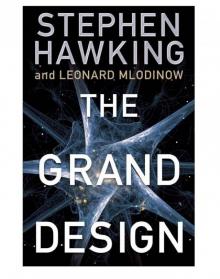 The Grand Design
The Grand Design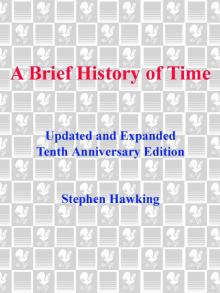 A Brief History of Time
A Brief History of Time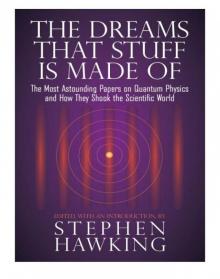 The Dreams That Stuff is Made of
The Dreams That Stuff is Made of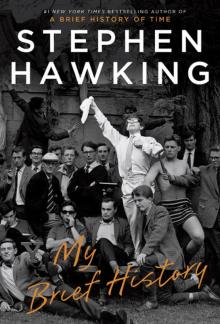 My Brief History
My Brief History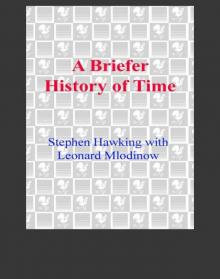 A Briefer History of Time
A Briefer History of Time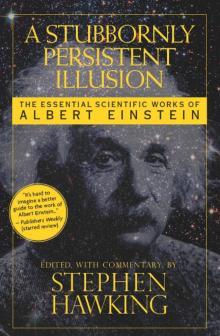 A Stubbornly Persistent Illusion
A Stubbornly Persistent Illusion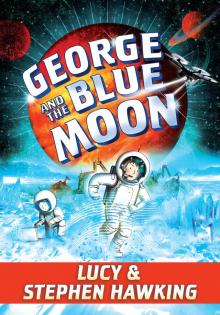 George and the Blue Moon
George and the Blue Moon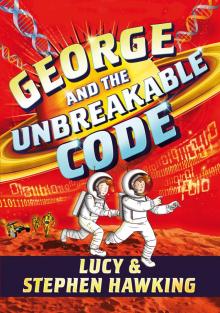 George and the Unbreakable Code
George and the Unbreakable Code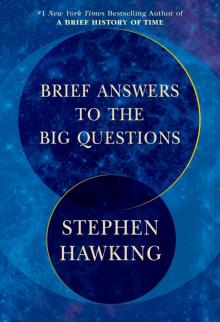 Brief Answers to the Big Questions
Brief Answers to the Big Questions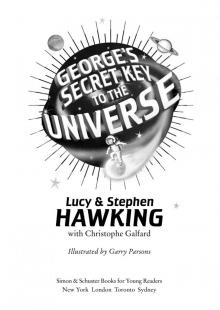 George's Secret Key to the Universe
George's Secret Key to the Universe